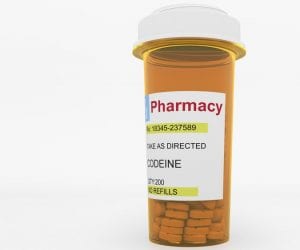Codeine
 Codeine is a narcotic painkiller that is being more and more frequently abused for recreational purposes. Like morphine, it is derived from opium, and popular street names for codeine include schoolboy, cough syrup, Captain Cody, and T-threes (when codeine is combined with Tylenol #3).
Codeine is a narcotic painkiller that is being more and more frequently abused for recreational purposes. Like morphine, it is derived from opium, and popular street names for codeine include schoolboy, cough syrup, Captain Cody, and T-threes (when codeine is combined with Tylenol #3).
What is Codeine Prescribed to Treat?
Codeine is typically prescribed to patients who experience mild to moderate pain, and it can also be used to treat diarrhea or suppress coughs.
How do People Abuse Codeine?
Many people swallow codeine tablets, but some abuse codeine by drinking strong cough syrup that has codeine as an active ingredient.
What Happens to the Mind and Body After Codeine Exposure?
Codeine is highly effective at blocking the pain signals that the brain sends to the rest of the body. At the same time, it produces a pleasant feeling of relaxation and increased well-being in the user. However, there are also negative side effects, including constipation, nausea, dry eyes and impaired coordination.
What are the Facts about Codeine Addiction?
Many people who end up addicted to codeine begin using the drug for legitimate reasons, but start taking higher doses at a more frequent rate and eventually become either psychologically or physically dependent. People often end up feeling like they need codeine in order to reduce their stress levels or help them sleep, and after a while it is difficult to imagine coping with stress or trying to go to bed without taking codeine first. In addition, codeine can cause rebound headaches that prompt further use of the drug in order to get rid of the headaches.
Why is Codeine Abuse Dangerous?
Death involving prescription opiates increased by 114% from 2001 to 2005, and the figures continue to rise. When taken in excess, codeine may cause seizures and breathing difficulties (which can be fatal). In addition, many people who use codeine recreationally will choose to combine it with other drugs, which could result in overdose and death.
What Treatment is Available for Codeine Users?
Codeine addiction must be treated at a physical and psychological level, so close supervision in a drug treatment center is the gold standard. Abruptly stopping codeine use can lead to withdrawal symptoms such as seizures and emotional disturbances, and professional care can help to make sure that these uncomfortable withdrawal symptoms do not lead to relapse. At White Sands, we also provide comprehensive therapy that aims to get to the heart of the user’s reasons for becoming addicted to codeine, reducing the risk of future problems with substance abuse.